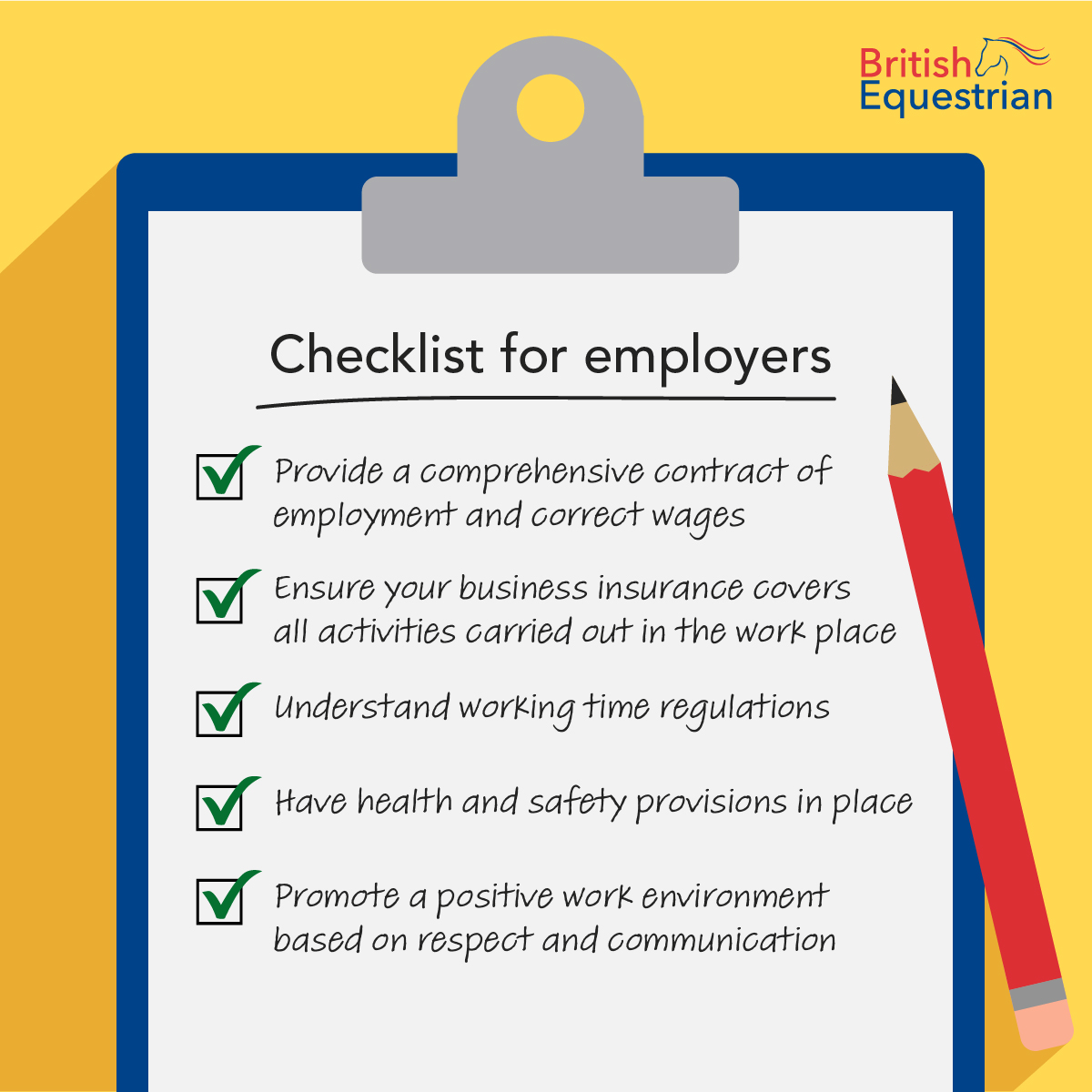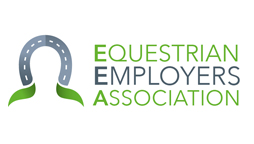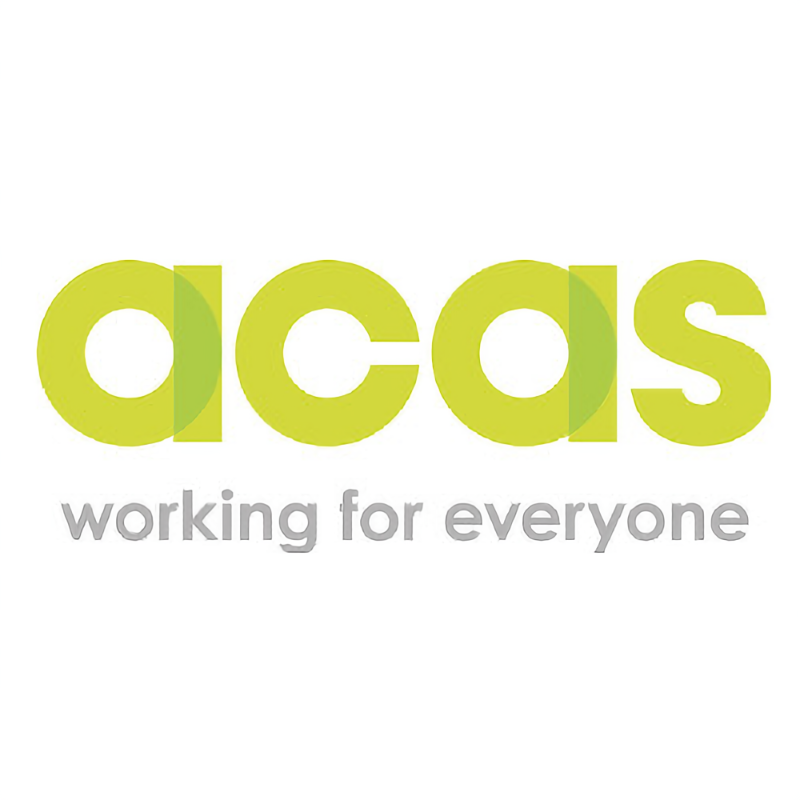Employers
As an employer, it is important to ensure you comply with all current employment and health and safety legislation when employing staff.
code of good employment
The Equestrian Employers' Association (EEA) is one of the key organisations in the Federation for anyone who employs staff in the equestrian sector. Their members range from employers of just one, to large yards with many staff. Being an EEA member give you free access to these online tools:
- Contract Creator
- Staff Handbook Creator
- Health and Safety Toolkit, including Risk Assessment Creator
- Legal helpline
The EEA have also created the 'Code of Good Employment' to guide employers to take ownership of their own governance and offer a framework to develop employment practices and business operations.
- Make it legal
- Pay correctly
- Good management
- Safe workplace
Common areas that employers get wrong:
- Low pay and long hours: many employers get the National Minimum Wage (NMW) requirements wrong because they pay a basic rate for a specific number of hours without taking into account the overtime worked by the groom. These additional hours also need to be included in any National Minimum Wage calculation.
- There is a general lack of understanding about the Working Time Regulations
-
Many employers fail to provide a written statement of employment particulars, often referred to as a contract of employment. All employees and workers have the right to a 'written statement of employment particulars'. Employers must provide a written statement:
-
no matter how long the person's employed for
-
on or before the person's first day of work
-
- Many employers’ mis-categorise the employment status of those working for them.
Written Statement/Contract of Employment
The following must be included in in the contract:
- your name, or the name of your business
- the employee’s name
- the date the employee started employment (this is usually the first day the employee started working for the employer)
- the date that 'continuous employment' started for the employee
- job title or a brief description of the job
- your address as the employer.
- the places or addresses where the employee or worker will work
- pay, including how often and when (for example, £1,000 per month, paid on the last Friday of the calendar month)
- working hours, including which days the employee or worker must work and if and how their hours or days can change
- holiday and holiday pay, including an explanation of how its calculated if the employee or worker leaves
- the amount of sick leave and pay (if this information is not included in the document, you must state where to find it)
- any other paid leave (if this information is not included in the document, you must state where to find it)
- any contractual benefits – these are benefits the employer must provide
- any non-contractual benefits – these are benefits the employer may provide but can choose not to
- the notice period either side must give when employment ends (note there are stator minimum notice periods)
- how long the job is expected to last (if it's temporary or fixed term)
- any probation period, including its conditions and how long it is
- if the employee will work abroad, and any terms that apply
- training that must be completed by the employee or worker, including training the employer does not pay for
Guidance available here: What must be included - Written statements - Acas
Becoming a member of the Equestrian Employers Association will allow you to access to an equestrian specific contract creator which will make the task of creating a contract straightforward.
National Minimum Wage
It’s a legal obligation to pay the NMW and employers who underpay their staff face a fine of 200% of the arrears – so the penalty is high. Consider:
- Use the National Minimum Wage and Living Wage calculator for Employers.
- Maintain comprehensive records for details of working hours, pay rates and any deductions or allowances.
- Keep employee contracts transparent regarding pay rates, working hours and overtime calculations. This will also helps avoid misunderstandings further down the line.
- Seek professional advice if you’re unsure about any aspect of National Minimum Wage compliance. Consult with HR specialists, payroll experts or HMRC directly.
National Minimum Wage as of 1 April 2024:
| Age | 21 and over | 18-20 | Under 18 | Apprentice |
| Wage | £11.44 | £8.60 | £6.40 | £6.40 |
National Minimum Wage as of 1 April 2025:
| Age | 21 and over | 18-20 | under 18 | Apprentice |
| Wage | £12.21 | £10 | £7.55 | £7.55 |
Increases in the National Minimum Wage can cause difficulties for many businesses, especially those who are already under financial pressure, but there are things you can do to help meet the demand:
- Streamline the daily running of your business, for example, reduce staff hours where possible, without compromising equine welfare standards. Be aware this requires clear conversations with your employees and changes to contracts.
- Cut business expenses, for example, consider switching energy suppliers and turn off lights, appliances and machinery when not required. Review insurance providers and policies at renewal time – do you have the most appropriate and economical cover in place?
- Consider buying second-hand equipment when possible.
- Increase costs of your service offerings. Make sure to communicate with your clients so they know what to expect and explain why the rise is necessary.
Be prepared for NMW rates for 2025, check the details here.
Maximum working hours
Caring for horses is not a 9 to 5 job but employees cannot be asked to work limitless hours with no rest breaks.
The Working Time Regulations set out the legal requirements around the number of hours an employee can be asked to work, both for the average number of weekly hours and also for rest breaks.
Under the Regulations staff must not work more than an average of 48 hours a week over a 17 week period. An employee can choose to work more than an average of 48 hours a week. They do this by signing an 'opt-out agreement'. There is no obligation on an employee to agree to opt out of the 48-hour weekly limit and the employer must not cause the employee detriment because they do not opt out.
Detriment means someone experiences one or both of the following:
- being treated worse than before
- having their situation made worse.
An employee can cancel an opt-out agreement at any time.
An employer must keep records to prove that:
- employees are not working more than the 48-hour weekly maximum – this is unless they have an opt out agreement
- they are not breaking limits for night working
- they have offered regular health assessments for night workers
- young workers are not working during a restricted period.
The records must be kept for 2 years from the date they were made.
Having clear and easy to understand records can help employers:
- prevent disputes
- protect the health, safety and wellbeing of their employees.
When employing staff think about how you can structure work patterns to ensure that staff get the right level of rest and that you are not putting the health of your employees at risk, or failing to pay them properly for the hours they work.
For more information see Acas: Understanding the Working Time Regulations - Acas
If you become a member of the Equestrian Employers Association you will have access to advice and information about working hours that are relevant to the equestrian workplace.
Health & Safety
Employees have:
- The right to a safe workplace – employees have the right to work in an environment where risks to their health and safety are properly controlled. Employers must provide a safe working environment and manage risks to employees’ health and safety, this includes the risk of stress. Employers also have a legal duty to prevent work-related stress and support good mental health at work.
- The right to information – employees have the right to be informed about health and safety matters that affect them. This includes being told about workplace hazards, risks identified through risk assessments and the measures that are in place to control those risks.
- The right to training – Employees have the right to be given adequate training on the health and safety procedures and practices that are relevant to their role. This training should cover how to work safely, the proper use of equipment and machinery, and emergency procedures.
- The right to refuse unsafe work – employees have the right to refuse to work if they believe there is a serious and imminent danger to their health and safety or that of others. Employees also have a right not to be disciplined for refusing to work or for contacting the HSE about these concerns.
Bullying and Harassment
Bullying and harassment are problems that can affect employees in the workplace. Both bullying and harassment are unacceptable, and the law makes it clear that all employees have the right to work in a safe environment.
Employers are responsible for creating and maintaining a safe workplace, free from bullying, intimidation and harassment. This obligation can also apply to work-related activities, such as work parties or outings. Employers should put in place a well-communicated policy and guidance that clearly states the employer’s commitment to promoting dignity and respect at work.
Promoting a positive climate at work for everyone based on personal respect and dignity will help to prevent inappropriate behaviour starting. A well-designed policy is essential to tackle bullying or harassment and may help employers defend claims, provided the employer also took all reasonable steps to prevent such behaviour.
Your policy should:
- Give examples of what constitutes harassment, bullying and intimidating behaviour. This should include cyber-bullying, work-related events and harassment by third parties.
- Explain the damaging effects the behaviour can have and why it will not be tolerated.
- State that such behaviour will be treated as a disciplinary offence where a case is proven.
- Set out how to get help and make a complaint, formally and informally.
- Set out who the policy applies to, for example, agency and freelance staff, also addressing third-party harassment and work-related situations outside normal hours.
- Promise that allegations will be treated speedily, seriously and confidentially, and that the employer prevents victimisation.
- Require supervisors/managers to implement policy and ensure it is understood.
- Emphasise that every employee carries responsibility for their behaviour.
From 26 October 2024, employers are under a new obligation to take reasonable steps to prevent sexual harassment of their workers. For more information see steps for employers to prevent sexual harrassment- Acas
Member Bodies that support Livery Yards and Riding Schools
ABRS+
ABRS+ host webinars open to both members and non-members which are free to attend. Topics include running a business, volunteers and planning for the future.
- See upcoming webinars and events to support your equestrian business here.
- See past webinars on ABRS+ youtube.
Becoming a member of ABRS+ can have many benefits, including full membership to the Equestrian Employers Association to support all of your employment, HR, health and safety and business needs as well as a free legal helpline.
British Horse Society
All centres approved by the BHS have an allocated Business Support Manager who is based in their region to support them with any queries or questions they may have. This means each centre has a designated person who will be at the end of the phone or available to come and visit you.
Being a BHS Approved Centre also means that you get access to –
- Regular free online sessions across a variety of topics
- Access to a legal support helpline
- Access to an Employer and HR guidance, documents, and advice through the LawAssure service
The BHS is also able to provide templates and guidance on documentation required by Local Authorities for the Licencing of Riding Centres.
Useful information
Hiring an apprentice can have many benefits to your business and is an opportunity to help grow the equestrian workforce. Find out more about hiring an apprentice.
More information and advice for employers within the equestrian industry available on The Grooms List.
For more support and advice, visit the Equestrian Employers Association website.
See our ‘Support for Employers’ page for resources and guidance available through our member bodies and other organisations.


